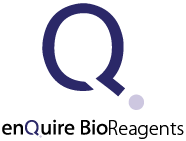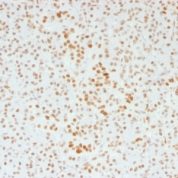Human Anti-ATRX / RAD54 Antibody Product Attributes
Species: Human
Tested Applications: Immunohistochemistry (IHC).
Clonality: Monoclonal
Anti-ATRX / RAD54 Antibody Clone: 39f
Clone 39f Host and Isotype: Mouse IgG1 kappa
Anti-Human ATRX / RAD54 Positive Control Sample: Raji, HeLa or A431 Cells. Pancreas, Adrenal, Ovary, Kidney, Prostate or Stomach.
Cellular Localization of Antibody <39f Staining: Nuclear
Buffer and Stabilizer: 10mM PBS with 0.05% BSA and 0.05% Azide
Antibody Concentration: 200 ug/ml
Antibody Purification Method:Protein A/G Purified
Immunogen: Recombinant human ATRX protein
Storage Conditions: Store at 2 to 8° C (refrigerate). Stable for 24 months when properly stored.
ATRX / RAD54 Previously Observed Antibody Staining Patterns
Observed Subcellular, Organelle Specific Staining Data:
Anti-ATRX antibody staining is expected to be primarily localized to the nuclear bodies.Observed Antibody Staining Data By Tissue Type:
Variations in ATRX / RAD54 antibody staining intensity in immunohistochemistry on tissue sections are present across different anatomical locations. An intense signal was observed in adipocytes in breast and mesenchymal tissue, cells in the glomeruli in kidney, cells in the molecular layer in cerebellum, cells in the red pulp in spleen, cells in the tubules in kidney, cells in the white pulp in spleen, chondrocytes in mesenchymal tissue, decidual cells in the placenta, endothelial cells in the colon, epidermal cells in the skin, exocrine glandular cells in the pancreas, fibroblasts in mesenchymal tissue, germinal center cells in the tonsil, glandular cells in the adrenal gland, appendix, breast, colon, duodenum, epididymis, fallopian tube, gallbladder, rectum, salivary gland, small intestine, stomach and thyroid gland, glial cells in the cerebral cortex, hematopoietic cells in the bone marrow, islets of Langerhans in pancreas, Leydig cells in the testis, macrophages in lung, myocytes in heart muscle and skeletal muscle, myoepithelial cells in the breast, neuronal cells in the caudate nucleus and hippocampus, non-germinal center cells in the tonsil, ovarian stroma cells in the ovary, peripheral nerve in mesenchymal tissue, peripheral nerve/ganglion in colon, pneumocytes in lung, respiratory epithelial cells in the bronchus and nasopharynx, smooth muscle cells in the smooth muscle, squamous epithelial cells in the esophagus, oral mucosa, tonsil and vagina and urothelial cells in the urinary bladder. More moderate antibody staining intensity was present in adipocytes in breast and mesenchymal tissue, cells in the glomeruli in kidney, cells in the molecular layer in cerebellum, cells in the red pulp in spleen, cells in the tubules in kidney, cells in the white pulp in spleen, chondrocytes in mesenchymal tissue, decidual cells in the placenta, endothelial cells in the colon, epidermal cells in the skin, exocrine glandular cells in the pancreas, fibroblasts in mesenchymal tissue, germinal center cells in the tonsil, glandular cells in the adrenal gland, appendix, breast, colon, duodenum, epididymis, fallopian tube, gallbladder, rectum, salivary gland, small intestine, stomach and thyroid gland, glial cells in the cerebral cortex, hematopoietic cells in the bone marrow, islets of Langerhans in pancreas, Leydig cells in the testis, macrophages in lung, myocytes in heart muscle and skeletal muscle, myoepithelial cells in the breast, neuronal cells in the caudate nucleus and hippocampus, non-germinal center cells in the tonsil, ovarian stroma cells in the ovary, peripheral nerve in mesenchymal tissue, peripheral nerve/ganglion in colon, pneumocytes in lung, respiratory epithelial cells in the bronchus and nasopharynx, smooth muscle cells in the smooth muscle, squamous epithelial cells in the esophagus, oral mucosa, tonsil and vagina and urothelial cells in the urinary bladder. Low, but measureable presence of ATRX / RAD54 could be seen inadipocytes in mesenchymal tissue, bile duct cells in the liver, cells in the endometrial stroma in endometrium, cells in the granular layer in cerebellum, germinal center cells in the lymph node, glandular cells in the parathyroid gland and glial cells in the caudate nucleus and hippocampus. We were unable to detect ATRX / RAD54 in other tissues. Disease states, inflammation, and other physiological changes can have a substantial impact on antibody staining patterns. These measurements were all taken in tissues deemed normal or from patients without known disease.Observed Antibody Staining Data By Tissue Disease Status:
Tissues from cancer patients, for instance, have their own distinct pattern of ATRX / RAD54 expression as measured by anti-ATRX / RAD54 antibody immunohistochemical staining. The average level of expression by tumor is summarized in the table below. The variability row represents patient to patient variability in IHC staining.| Sample Type | breast cancer | carcinoid | cervical cancer | colorectal cancer | endometrial cancer | glioma | head and neck cancer | liver cancer | lung cancer | lymphoma | melanoma | ovarian cancer | pancreatic cancer | prostate cancer | renal cancer | skin cancer | stomach cancer | testicular cancer | thyroid cancer | urothelial cancer |
|---|---|---|---|---|---|---|---|---|---|---|---|---|---|---|---|---|---|---|---|---|
| Signal Intensity | ++ | ++ | ++ | ++ | ++ | ++ | ++ | - | ++ | ++ | ++ | ++ | ++ | ++ | ++ | ++ | + | ++ | ++ | ++ |
| ATRX Variability | ++ | ++ | ++ | ++ | +++ | ++ | ++ | ++ | +++ | ++ | ++ | ++ | ++ | + | ++ | ++ | ++ | ++ | ++ | ++ |
Limitations and Warranty
enQuire Bio's ATRX / RAD54 Anti-Human Monoclonal is available for Research Use Only. This antibody is guaranteed to work for a period of two years when properly stored.





There are no reviews yet.